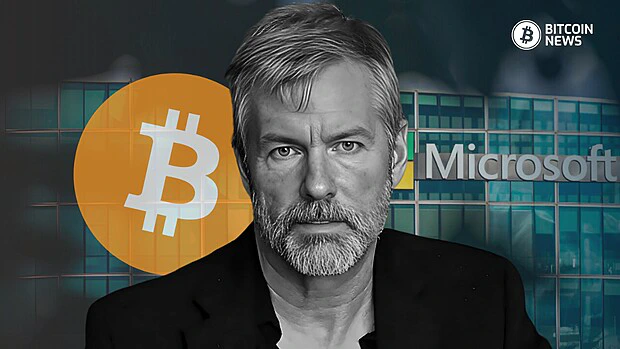Michael Saylor, the outspoken Executive Chairman of MicroStrategy and a well-known Bitcoin advocate, recently made waves with his bold Bitcoin presentation to Microsoft’s board.
In a 3-minute pitch to Microsoft’s board of directors, Saylor passionately argued for the tech giant to adopt bitcoin as a central financial strategy. His proposal, made ahead of Microsoft’s shareholder vote on December 10, has sparked widespread debate about Bitcoin’s role in corporate America.
Saylor’s central argument was that Bitcoin represents the next major technological transformation. “Microsoft can’t afford to miss the next technology wave, and Bitcoin is that wave,” he asserted.
He described Bitcoin as “digital capital,” a revolutionary form of wealth preservation that surpasses traditional assets like bonds or gold.
Saylor highlighted that if Microsoft embraced bitcoin, it could add “hundreds of dollars to the stock price”, and create trillions of dollars of enterprise value.
He added:
“Bitcoin is the best asset that you can own. The numbers speaks for themselves. It makes a lot more sense to buy bitcoin than buy your own stock back, or to hold bitcoin rather than holding bonds. If you want to outperform, you need Bitcoin.”
Bitcoin is already the seventh-largest global asset by market capitalization and has consistently outperformed other asset classes, including Microsoft’s stock. Highlighting its growth potential, Saylor predicted bitcoin’s market cap could rise from its current $2 trillion to $280 trillion by 2045.
Saylor painted a compelling picture of how bitcoin adoption could dramatically increase Microsoft’s valuation.
If Microsoft allocated its cash flows, dividends, and stock buybacks to bitcoin, the company’s share price could increase by $584 over the next decade, he claimed. This would add a staggering $4.9 trillion to Microsoft’s market capitalization.
He also pointed out that bitcoin’s uncorrelated nature makes it a superior asset for corporations looking to reduce risk and improve long-term shareholder returns. Saylor stated:
“You have a choice to make. Cling to the past, or embrace the future. Divest billions of dollars and slow your growth rate, [or] invest billions of dollars and accelerate your growth rate.”
To back his claims, Saylor shared the success of MicroStrategy, the company he leads.
In continuation of its aggressive bitcoin acquisition strategy, MicroStrategy purchased another 15,400 BTC yesterday, becoming the fourth-largest bitcoin holder, with holdings nearly double those of the U.S. government.
Since adopting bitcoin as its primary reserve asset in 2020, MicroStrategy has acquired over 402,000 BTC at a cost of $21.9 billion. With bitcoin now trading near $100,000, this investment is valued at over $38 billion.
The strategy has also driven MicroStrategy’s stock price up by an astonishing 3,045%, vastly outperforming Microsoft’s 103% growth over the same period.
Saylor also highlighted the growing global acceptance of Bitcoin, referring to it as part of a “crypto renaissance.”
He pointed to the increasing adoption of Bitcoin investment products by Wall Street, pro-Bitcoin policies expected under the upcoming U.S. administration, and new initiatives like Brazil’s proposed national bitcoin reserve.
Saylor laid out two clear options for Microsoft:
- Stick to traditional financial strategies such as stock buybacks and bonds, which he argued slow growth and increase risk.
- Embrace Bitcoin to accelerate growth, reduce investor risk, and align with emerging technological and economic trends.
“Do the right thing for your customers, employees, shareholders, the country, the world, and your legacy. Adopt Bitcoin,” Saylor urged in his final appeal.
While Saylor’s proposal has sparked excitement among Bitcoin enthusiasts, it also raises questions about the digital asset’s volatility and regulatory uncertainties.
Critics argue that the risks associated with bitcoin, including potential market crashes and regulatory changes, could outweigh the benefits.
Bitcoin proponents, however, argue that volatility is an inherent feature of a developing asset. As the asset matures, they believe its price fluctuations will naturally stabilize.
Additionally, they claim that Bitcoin currently benefits from a level of regulatory clarity unmatched by any other digital asset.
Microsoft’s decision to even consider bitcoin represents a significant shift in corporate attitudes toward digital assets. The upcoming shareholder vote on December 10 will determine whether the company will take Saylor’s advice and begin diversifying its balance sheet with bitcoin.
Regardless of the outcome, Saylor’s pitch reflects a growing trend of large corporations exploring bitcoin as a strategic asset. If Microsoft moves forward, it could set a precedent for other tech giants, potentially making bitcoin a mainstream part of corporate finance.
Whether Microsoft takes the leap or not, the debate underscores Bitcoin’s increasing relevance in the corporate world and its potential to reshape the global financial landscape.










